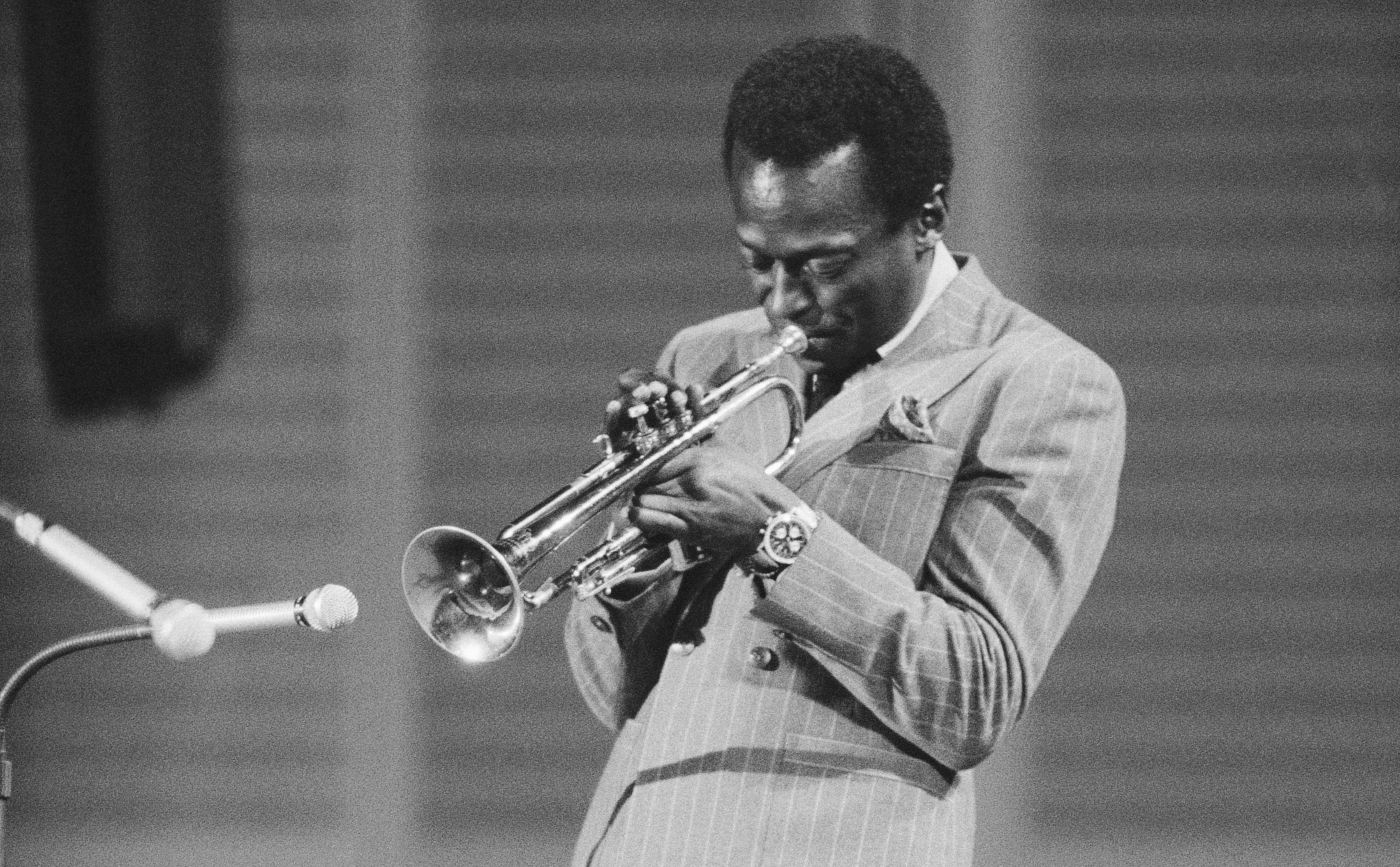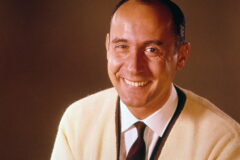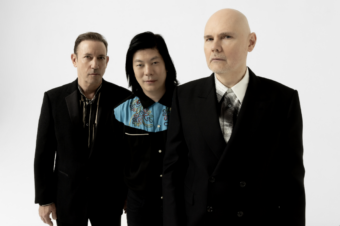This is Part Two of “Miles Style,” SPIN‘s two-part story on the life and legacy of Miles Davis. Part Two originally appeared in the December 1985 issue of SPIN. (Check out Quincy Troupe’s other essay, as well as his contributions to the American Book Award-winning memoir, Miles: The Autobiography, here.)
“When I came to Columbia in 1977,” says George Butler, “Miles wasn’t playing. When I decided to try to get him back in the studio again, everyone laughed and said ‘Forget it.’ But my gut feeling was that Miles was too ingenious and too creative just to stop playing forever. I felt that he probably needed that time off to recoup, to think about what he had done and where he wanted to go with his music. So I just called him and started visiting him every day for eight months. We didn’t talk about music, but about cars, clothes, boxing.”
“Sometimes we wouldn’t talk about anything, wouldn’t talk period, but would just watch Miles’s television, which was always on. I don’t think Miles was in the best of health during those days. He seemed to be in an indifferent kind of spirit, just letting things happen, a period of no purpose.”
After eight months, Butler finally broke through. Miles was coming back. In the early spring of 1980, Butler was sitting perviously in the studio, waiting for Miles to show up. He was three hours late. All the musicians were there—drummer Al Foster, bassist Marcus Miller, guitarist Larry Coryell, and keyboardist Pete Cosey.
But no Miles. Finally, when Butler was on the verge of panic, Miles showed up, but without his trumpet. He had just come to listen. And he didn’t like this combination of musicians. They tried other musical combinations again and again and again. Each time Miles showed up without his trumpet. He would sit and listen, then leave. Butler was close to a mad panic, but managed to keep his cool. Finally, after hearing the combination of Miller, Foster, Sammy Figueroa on percussion, and Bill Evans on reeds, Miles returned the next day with his trumpet.
But Miles’s chops were down. Says Butler, “I realized that Miles didn’t have his embouchure and that he was playing out of control and couldn’t execute his musical ideas. But I just hung in there, as we all did, and each day I could hear Miles getting stronger, the lip getting stronger, his control coming back.”
“And as we started to record, I was really becoming excited—I had been cool about everything up until now—because I had done something that everyone else had failed at: getting Miles back into the recording studio.”
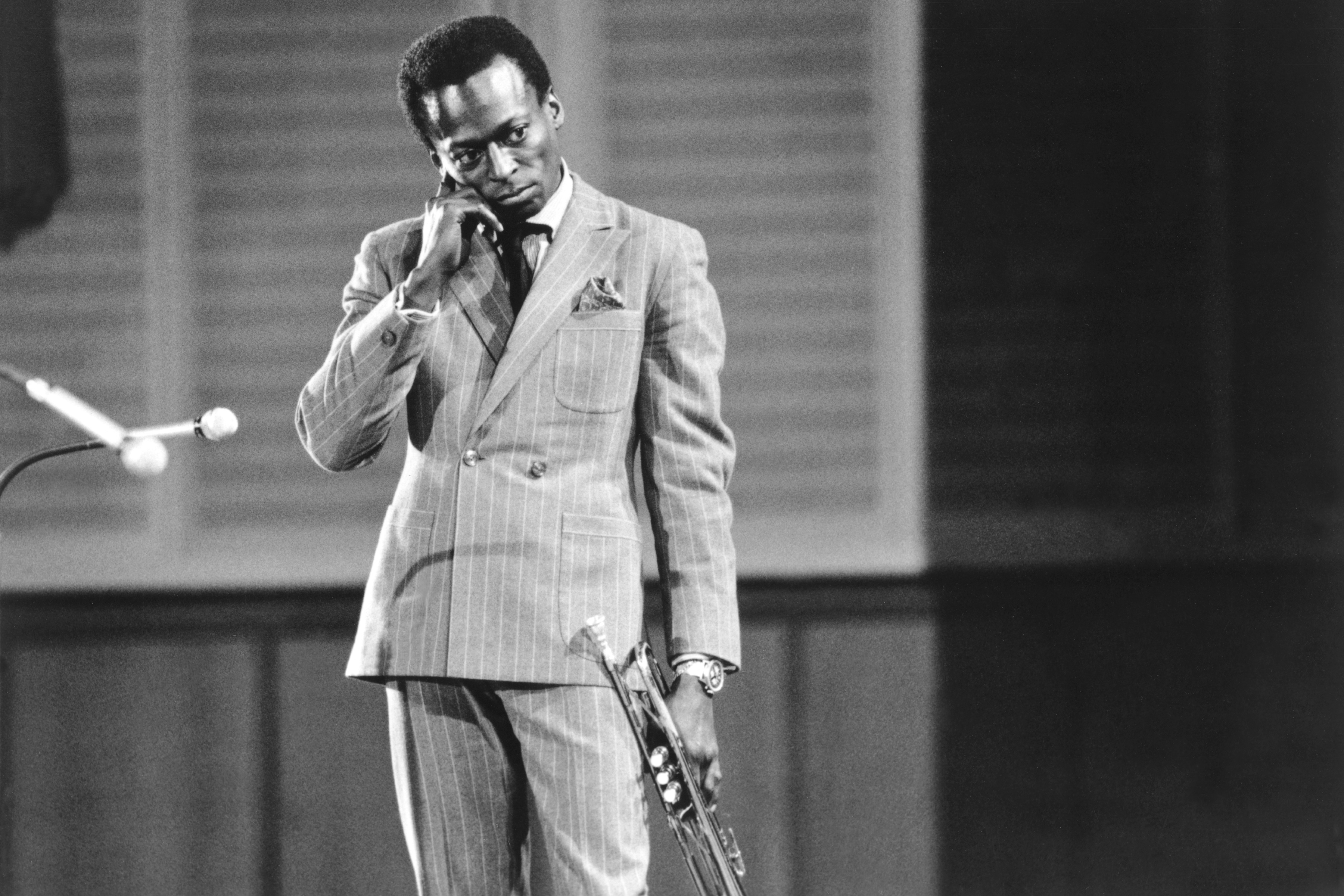
In 1981, Miles released The Man With the Horn, which was critically panned. Miles’s first public appearance was in Boston that year. There were long lines. Despite their criticism of the album, critics turned out in droves for the long-awaited performance. Once again his music had changed. It was more pop, mixed with voices, rock, and jazz.
“His new music doesn’t touch me,” says Leo Maitland, a New York physicians and surgeon and old friend of Miles’s. “What he’s doing now isn’t creative at all. Because he’s so famous, he can put almost anything on record and it will sell. He says he wants to reach a new audience. But what audience is it? It’s an audience that spends a lot of money on records, stereo equipment, concerts, and so on. The people he’s trying to reach would buy almost anything if the product is promoted properly. It’s not the musical content they’re buying but the celebrity of the person promoted.”
But then, perhaps, it’s about what Olu Dara so succinctly stated: “Miles has never given up his youthful energy, and this makes him timeless. Miles never gave up the childlike aspects of his life, and that’s very important for an artist in communicating. Miles has kept the language of a child, of discovery. He keeps in contact with his culture and the young, and this keeps him young. He has an affinity for the young.”
“That’s why he can dress and play music the way he does, because he has no fear of being himself or relating to the young. He knows that’s where the future is at. He’s not about a cultural or generational gap. Most adults are boring and stupid because they get institutionalized around 18. This didn’t happen to Miles, and I think he’s the better for it, and so are we.”
And so we are. In 1981 Miles went back on the road full time, though at times his health was precarious. he married actress Cicely Tyson at the home of Bill Cosby. (Andrew Young was the presiding minister.) And in quick succession he released We Want Miles, Star People, Decoy, and the new You’re Under Arrest, which sold over 100,000 albums in the first weeks of its release.
Branford Marsalis, the young reed man, who is Wynton Marsalis’s older brother, played soprano saxophone on Decoy. “Working with Miles was real cool because he understood where I was comin’ from musically immediately. I have the utmost respect for Miles. He hires musicians he thinks can do the job he wants. And because he hires you, because he thinks you can do it, he don’t tell you shit. In the studio he just points at you when he wants you to play. He doesn’t want you just to play a bunch of notes that are written on the page. Instead, he wants you to play the music and make the music sing. Not like some music student playing notes. Because the notes can be right but the music can be wrong because it doesn’t sing.”
“So when he snatched the music off my stand at the Decoy session and said ‘Man, I said play it, not play it,’ Miles meant for me to interpret the written music and not play what was written on the page. He meant for me to play myself, play in my own voice. Play me. So I did. I played against the chords that Miles had written, like I normally do. So I was playing against chords that were already against chords. It worked. And Miles looked at me and said, ‘Yeah, that’s it. That’s it.'”
* * *
Although Miles and Branford Marsalis get along, his relationship with Wynton Marsalis has been filled with problems. They say they don’t dislike each other, and George Butler, who served as executive producer for both before Miles jumped ship to Warner Bros., says the friction is mainly an invention of the press. Miles agrees—in part. the other part is real anger.
“People want to know why Eddie Murphy makes so much money,” Miles is saying in the living room of his New York apartment. “Hell, they hold all the other actors down. So that when one gets loose, that one makes so much money, it’s a shame.”
He pauses to collect his thoughts and continues. When Bill Cosby won all the wards for best series of television, you could hear a pin drop at the awards ceremony. Because all of those networks outside of NBC had turned his show down. I know, because me and Cicely was there. We saw it go down. I think most of them didn’t want the show because it’s black and positively black. People want to see blacks crawlin’ around and Uncle Tomin’. And they like to compare black people who are doin’ somethin’ with each other. They’ll compare Eddy Murphy to Richard Pryor. Compare me with Wynton Marsalis. Not me with Chuck Mangione. But me and Wynton. That’s the kind of shit I don’t like.”
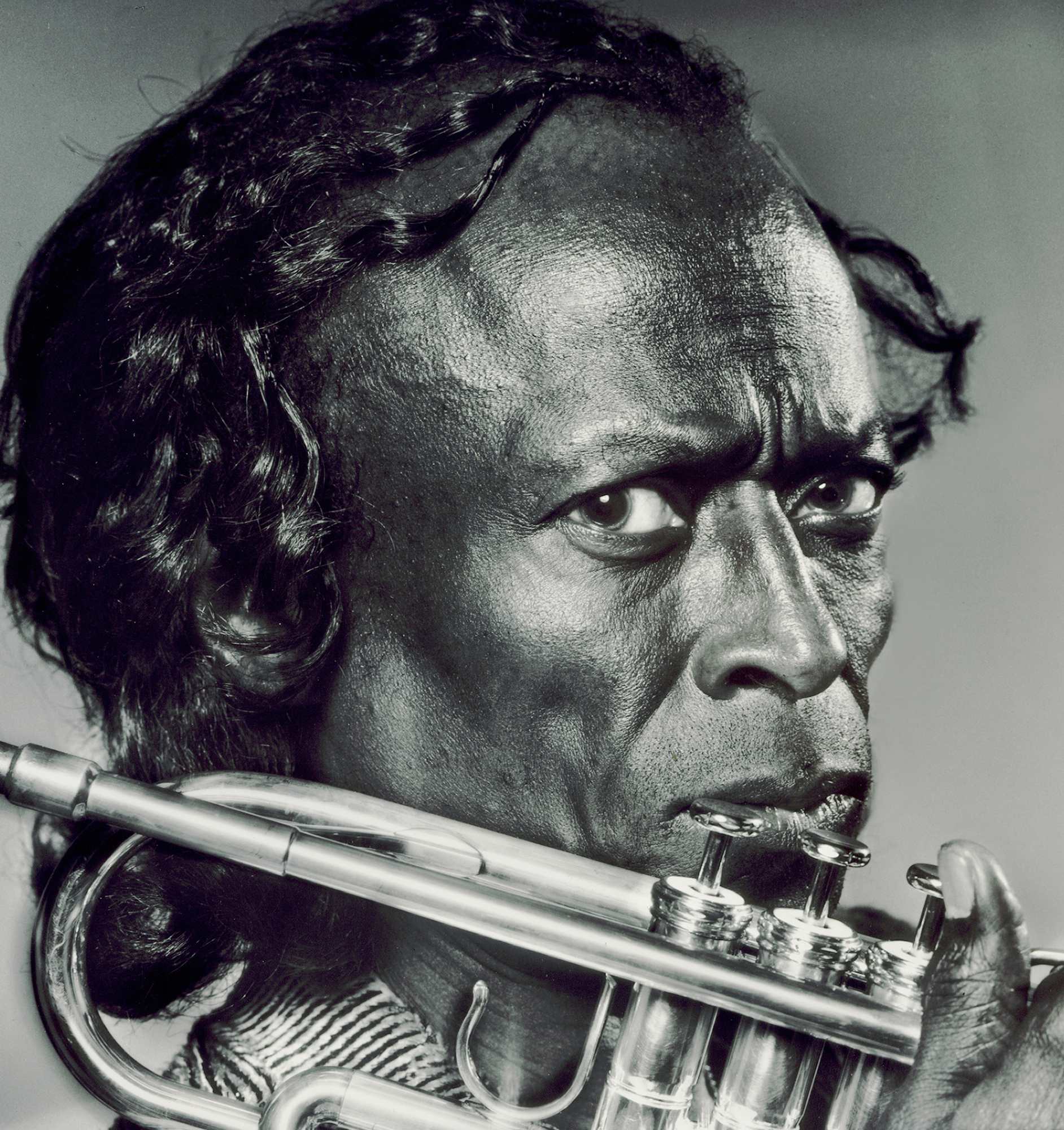
“But if Wynton listens to all that shit,” he goes on, “they goin’ to fuck him up. I don’t be listenin’ to none of that shit. But he better watch out. They’ll make him comfortable and he’ll stay right where he is. That’s what they want him to be—comfortable. I don’t like a person that’s comfortable where they are. I like a person that’s always movin’, changin’, one that says, ‘What’s this? What’s that? Why they doin this?’ That’s the way Cicely is. And that’s the way I am. Been like this all my life.”
“Like, there could bee some classical composers instead of a classical soloist like Wynton,” he goes on, warming to the subject. “Why don’t they take some young composers’ work and play that instead of all that old shit. I mean, they’re gonna have to change sooner or later. Time is gonna make them change. I mean, they gotta stop doin’ Tosca and all that dead old classical shit. And Wynton playin’ their music. The kind of stuff anybody can do. All you gotta do is practice, practice, practice.”
“I told Wynton they should be suckin’ his dick for playin’ that old, simple music. I told him I wouldn’t bow down to play that music, that they should be glad that someone as talented as Wynton is playing that tired shit. I wouldn’t. I did it once, but I wouldn’t do it no more. I mean, Wynton’s takin’ time off from playin’ his own shit to play their shit. And if he misses one goddamn note they gonna be on his ass. Naw. I don’t think no honor should be bestowed on a black person just ’cause he’s playin some fuckin’ ‘Flight of the Bumblebee’ shit. Hell, man, Wynton should be gettin’ a lifetime salary for playin’ that music.”
“I mean, bein’ a black person, I don’t accept that shit that so-called jazz has stagnated. White people teachin’ jazz in schools now. Tryin’ to claim it as theirs. But I don’t see why our music can’t be given the respect of European classical music. I mean, Beethoven been dead all these years and they talkin’ about him, teachin’ him, and still playin’ his music. Our music is classical. They just don’t want to do it because black people started it.”
“My point is,” he says, biting down on another Danish as he draws another line on yet another drawing, “why should black people devote their time to learnin’ their music, their operas, their reasons for falling’ in love, their reason for committing suicide, the way they fuck, the way they talk, the clothes they wear, their problems, you know what I mean? Damn.”
He goes on, “at 1 o’clock on the fuckin’ TV, all you can see is them with their hair all fixed up and shit, talkin’ about, ‘Well, I don’t know if Jim’s gonna tell me not to go with Irving ’cause my mother used to go with his mother.’ That kinda shit! That’s not us! That’s not black! We don’t go to church every Sunday and do what they do. We don’t sit up there and listen to Billy Graham and that other motherfucker, Bishop Sheen, who be soundin’ just like Reagan. No, I won’t ever do their shit no more and I don’t see no honor in no other black person doin’ their shit.”
It’s getting dark outside. The sky is becoming almost as gray as this apartment Miles shares with Cicely. The couch is gray suede and there’s gray carpeting on the floor and gray suede on the wall. I watch him draw a line on the painting with the help of the edge of his Sorcerer album cover, the one with Cicely’s picture on the front. Next to me is the gray papier-mâché drawing Anthony Quinn gave him. It reminds me of a Picasso drawing. Stacked against the walls in this alcove-like room are piles of Miles’s drawings. I ask him if he feels he is misunderstood because of his bluntness.
“Yeah,” he says looking directly at me. He pulls at the collar of his black silk shirt. “White people misunderstand me. But I don’t have no trouble out of black people. The only trouble I have ever had from blacks was from bourgeois black people.”
I remind him that he comes from very middle-class roots. So what sets him apart from other middle-class people?
“Man, I’m from East St. Louis, and everyone there, for the most part, talks the same way.” He pauses and looks at me with a little irritation and anger in his eyes. “You from St. Louis, you oughta know that! You know how fucked up it can be back there! Them some bad motherfuckers back there.”
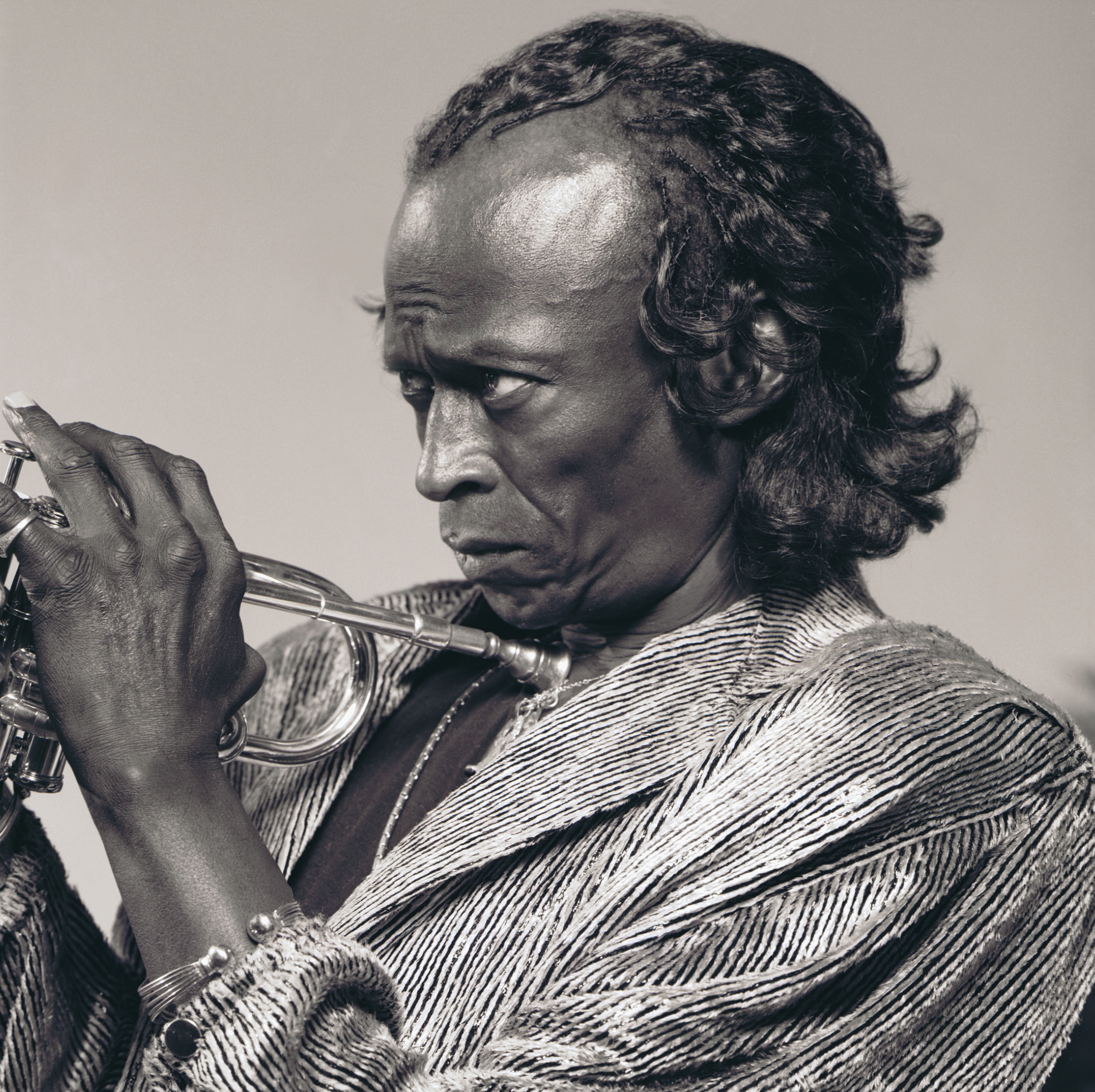
“But I don’t like that part of the country no more, you know what I mean? I mean, they got a school back there named after me. And on the day they named the school after me, a detective comes up to me and was fuckin’ with me in the hotel I was stayin’ in. And this happened on Miles Davis Day! So you see, nothin’ changes if you black. Nothin’. I started to sue them motherfuckers. Gonna arrest me on my day.”
But official honors and Miles have never gotten along, and even though he won a grammy for Decoy, he isn’t appreciative. Typically Miles.
He has been standing up drawing for almost three hours. The phone has rung a few times and he has talked to a few people. But for most of the time, he has been drawing and talking. He offers to show me the view from his 17th-floor balcony overlooking the park. It is dramatically beautiful. I ask him what groups and musicians he does like. Which ones would and wouldn’t he play with if they asked him?
“I like Frankie Beverly and Maze,” he says, pulling on the slack in his black leather pants. “I just did a number dedicated to them called ‘Maze.’ I would put a horn solo on one of their albums if they asked me and I was free. I would for Michael Jackson. Jeffrey Osbourne, Stevie Wonder, George Dukes, Herbie Hancock, Nick Ashford and Valerie Simpson, Prince, and Kool and the Gang. Man, that’s a helluva band they got.”
“I like Kenny Loggins, Phil Collins, the Police. The Cars sound pretty good. Journey. I like Cyndi Lauper. Madonna. You know, Reggie Lucas, Madonna’s producer, used to work for me. He got mad at me because I told him he wasn’t a soloist but he was good at writin’ music and playin’ rhythm and background stuff. Now look at him. He’s a millionaire. Makes more money than I do.”
“But people like Mick Jagger, who I don’t have nothing against personally,” he goes on. “But I’d maybe be willin’ to do somethin’. He used to hang around outside my house. But it’s an attitude that some of them rock stars have, that I should be willing to work on one of their albums. That I don’t like. Fuck that! Fuck Mick Jagger! He asked me to do somethin’, but I couldn’t see myself doin’ what he wanted. Maybe he could. Maybe he just wanted to use my name. Maybe I should do it.”
“But you know, if I don’t do it with Nick Ashford and Kool and the Gang—I was out of town when they both asked me—why should I do it for Mick Jagger? His style is not my style. But I can see why white people like him. He runs and jumps up and down and don’t have no beat or rhythm, just like they do. That turkey kind of stuff.”
“But some white people can get down! Like them people in Phil Collins’s video, ‘Sussudio.’ That’s a bad number. He’s somethin’ else. And them white girls he got dancin’ in front of him in that nightclub scene in that video be dancin’ their asses off. But Mick Jagger don’t do that. He runs and jumps straight up and down and shit. But white people love him. You ask most black people to go see him and they be ready to fight. Tell you to get the fuck out of here.”
Changing the subject, as if anticipating the question, Miles volunteers to tell me who his favorite old groups were. “I loved playin’ with Coltrane,” he says. “He was a lot like Charlie Parker. They both liked to live life to the fullest. They ate a lot. Drank a lot. Did a lot of drugs. Things like that. But ‘Trane stopped. He was the nicest, the most gentile cat. He was quieter than Bird. But they could both play their asses off.”
He pauses to think for a moment and continues. “I liked playin’ with the Coltrane groups and I liked playin’ with Herbie, Wayne, Ron, and Tony. Especially live. Four and More and My Funny Valentine, where we had George Coleman on tenor saxophone, are my favorite live albums. But I like all my bands. The band I’m with now, they’re also among my best friends.”
He motions for me to follow him back into the apartment from the balcony. We pass between his bed and couch, both of which are set on high platforms and afford great views. The television is on, as it always is. A few clothes are thrown here and there. “I’m comfortable when I’m with someone I love, like Cicely, and if the music is good,” he says, “but if the music isn’t working, then I’m hard to be with.”
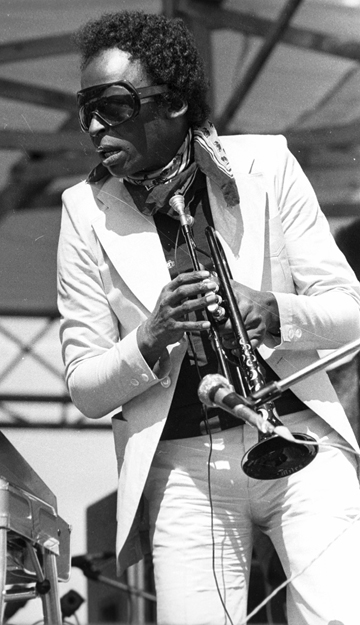
“Miles is getting into a kind of hip, contemporary music,” says George Butler. “He’s on the threshold of finding a new direction. What he’s doing now is a little more innovative than what a lot of rock artists are doing. And although it’s very inventive, I’m not certain that Miles has fully captured it yet. But I hear something new and refreshing, and I think that maybe in another six months to a year he’ll be doing something special. After all, this group hasn’t been together for long. They’re just now beginning to be really compatible musically with each other. They’re just now beginning to anticipate each other and work together as a unit.”
“And Miles is a kind of conductor. He orchestrates. You never know what he has in mind. But you know that what he’s about to do is going to be almost unprecedented. I mean, Miles has the advantage of a jazz background, of having been immersed in what goes on classically, being one who listens to all kinds of music. So he has the capacity to put all of that together and come up with something that’s quite inventive.”
Ornette Coleman, who heard Miles’s new band at Avery Fisher Hall during the 1985 Kook Jazz Festival, agrees: “He was personally playing fantastic. But he needs to enlighten his band some more so they can play on his level, so they can know why they’re playing what they’re playing. They need to get the band sound together. If Miles had my band then you’d really hear some new stuff. But Miles is playing beautifully.”
As always, Miles isn’t listening to what his critics are saying.
“I never think about topping or going past myself. Maybe,” and here he pauses for a long moment, searching for the proper words, almost like his trumpet sometimes pauses and hangs in space as if tentatively searching for the right note, the right chord. “I think sometimes about going past someone else, past what someone else has done. But never myself. I just keep playing and writing music the best I can. It’s what I do best. It’s what I love.”
“You know,” he continues, “I’m psychic sometimes.” He laughs, perhaps at the audacity of the statement. “I can predict shit. It scares the fuck out of me sometimes. But I never dream about playing music, or about my career. I don’t read that much either, because books fuck a lot of people up. Some women don’t get a sexual orgasm, so they go read a book on how to get one. This happens especially with white people. But I’ve seen black people fucked up by too many books. Just because it’s written down doesn’t mean it’s true. But I still respect some people who are well read.”
“Some writers are so dishonest, man,” he goes on, shaking his head in disgust. “That’s why I don’t talk to writers much. Because a lot of them just outright lie on you. I remember when they wanted me for the cover of Time and the reporter kept coming by my gigs and my house unannounced. So I wouldn’t talk to him. Wouldn’t do it. So he writes in the magazine that I was teachin’ my kids to hate white folks. So they put Thelonious Monk on the cover. I shoulda sued them motherfuckers.”
“And do you know that I have never been on the cover of a black magazine?” he says, looking at me to see if I believe him. (I am shocked.) “I’m always on the covers of European and Japanese magazines. But never on the front of any black magazines. But then, black magazines are so goddamn bourgeois, you know what I mean? They got to get out of that shit.”
His style of dress has changed. He has replaced much of his British and rock flair with a Japanese style, although he says he just had his tailor make him a British-style suit. He says he likes Italian designer Gianni Versace and Japanese designers Kansai and Issey Miyake.
It’s getting dark now. I have been here almost six hours. Miles has run out of Perrier and Danishes and we are now eating salami sandwiches, which we wash down with Orangina. he apologizes for the salami, saying he would cook me something if he had more time but he has to go downtown shortly. He has competed maybe four, five drawings since I arrived. His apartment looks like it’s home to a painter, not to a musician, except for the red trumpet on the table.
When I came to interview Miles, I expected to find him distant and hard to get to know. But I have found just the opposite. He doesn’t know why people think he’s difficult. He thinks it’s because of his outspokenness and because he won’t play the old music many want to hear.
“Some people just like to knock success, like crabs in a barrel,” says Lester Bowie. “It’s envy, it’s not knowing or appreciating Miles. Some people just want to put down greatness. They want us to think Miles is a fluke. I mean, they can think of any excuse why Miles is Miles. But Miles is Miles because he’s an extremely intelligent, sensitive, articulate, bad motherfucker. I really don’t understand how anybody can deny Miles. Even if you don’t like him personally, you can’t deny his greatness, his genius.”
“Just look at the facts. Here’s a man who is 59 years old, has been on top of the music business for 40 years, and is still the man even when he goes to the bank to check out his money! He’s the highest-paid jazz performer for all of these years and wins in the polls. You’ve got to respect these things. He’s my musical daddy and he’s Wynton’s musical grandfather. Everybody who plays trumpet has got to go through Louis Armstrong, Diz, and Miles Davis. Nobody can ignore Miles on that instrument.”
But what about his critics, who say Miles’s new music is not happening, even though audiences love it?
“Well, it’s very simple,” says Max Roach. “Music criticism as it’s practiced in the classical sense doesn’t accommodate an improvisational, constantly evolving, and creative artist like Miles. Critics come to criticize. They don’t have a yardstick by which to measure him like they do with someone who performs a Beethoven piece, basically played the same way over and over again. They can’t pigeonhole Miles the way they’d like. I don’t know of any critic who has developed a true measuring stick for improvisational music.”
“So it’s on the critics, not Miles. He accepts the danger of change. He takes the chance of being different from yesterday. That’s what music is all about. If you can’t accept the concept of change, then you’re creating as a creative artist. Miles isn’t a cheat.”
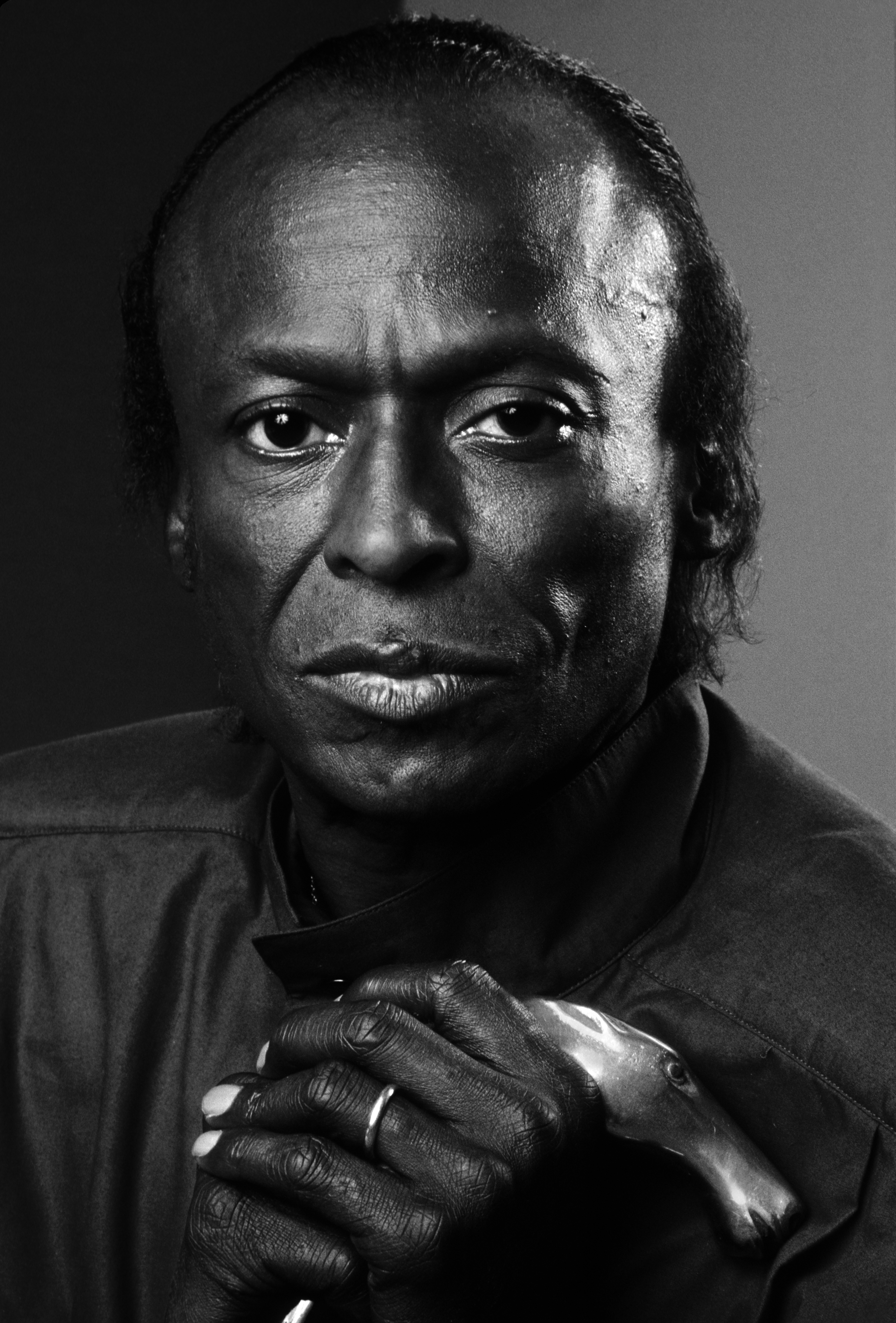
The language Miles speaks through his trumpet is a personal one, one that is almost mysterious, magical. Olu Dara says it is “tribal” and can say “a whole lot in one note.” A note can mean “an attitude, and beyond this, it is a philosophy.”
At times Miles seems lonely, sad. He carries with him an aura of inconsolable grief and sadness. Many of his closes friends and musical comrades have died. Both of his parents are dead.
If Miles does carry this burden, his is also a playful, warm, and very funny man. And if he opens up to you he can keep you laughing for days.
At his live concerts now he seems more accommodating and solicitous of his audiences. He walks the edge of the stage these days, bent over, playing his red or green or blue trumpet wired with its portable microphone.
He greets well-wishers by waving his hand or nodding, his eyes like headlights behind his large, wraparound sunglasses, trying to zero in on someone he knows. When he does, he smiles and points at them in recognition. he still plays with his back to the audience, a habit that has incensed critics over the years.
(But how do they expect him to conduct his band? I mean, he has to gauge what the musicians are playing at the precise moment they’re playing.)
He says he is more relaxed because he gave up drinking and drugs. He also admits that his positive frame of mind is due to his marriage to Cicely Tyson, though he is reluctant to talk about their private life. But he does say that he stopped smoking when Cicely wouldn’t kiss him because his breath reeked of stale cigarettes. He says he got tired of having to chew gum and rinse with mouthwash before he kissed her. So he just quit.
Last summer Miles left Columbia Records for Warner Bros. because he said he needed to make a change. George Butler agrees, but adds, “There’s been no one more devoted to Miles Davis than Columbia. I’ve been most devoted to him. but Miles felt it was time for him to move on. He felt he had to do something different from what he has done. I think the music he’s getting into now had something to do with it.”
“Perhaps Miles feels that continuing on Columbia and being recognized constantly as a jazz artist might prevent him from full acceptance in doing this new kind of music that’s really rock-oriented. And Warner is more rock-oriented. But I know that his leaving is nothing personal. I’m pretty certain Miles and I are still very good friends. I’m sorry to see him go, and I think it’s a mistake. But if it were ever proved to be a mistake, Miles would never, ever acknowledge it.”
Columbia is planning to release a recording in January that Miles made with a Danish big band.
“It’s another innovative album,” Butler says. “He did it with a 22-piece Danish orchestra. It’s quite different, new music. Miles is again going in another direction. It’s fantastic and will probably be a double album, consisting of orchestra and synthesizers. it’s brilliantly composed, arranged, and performed.”
Also ahead is a possible Great Performance program for public television next year. It will be a 90-minute show with interviews, Miles and his group playing, and perhaps the premiere performance of a dance piece Miles has written.
He has also changed management. “David Franklin is my new personal manager,” he says as he searches for a pair of shoes to put on. “He’s takin’ care of the artistic part of my life right now. I got black people handling my money now.”
He smiles as he says this, almost proudly. “Some people don’t know how to talk to people in the arts, you know what I mean? Hell, we artists are not normal people. You can’t do the same type of shit with artists that you do with other people. Accountants most times can’t talk the language of artists. They be lookin’ at how an artist might look, and that ain’t got nothin’ to do with nothin’.
“See,” he goes on, jabbing his index finger in the air for emphasis, “they be a drag! It makes you stop and think, because they don’t know about your side, the artistic side of the deal. Most of the time, they don’t respect your side. So fuck them, man! For a long time they had me thinking that they was right. That was my problem. When I let my guard down it hit me in the face. They was really juggling my ass up and down. Them accountants. Them motherfuckers. they was makin’ my life short, you know,” he says, his eyes flashing. “They was fuckin’ with me and I turn around and be fuckin’ with Cicely and then she fucks with me. So I had to stop that shit.”
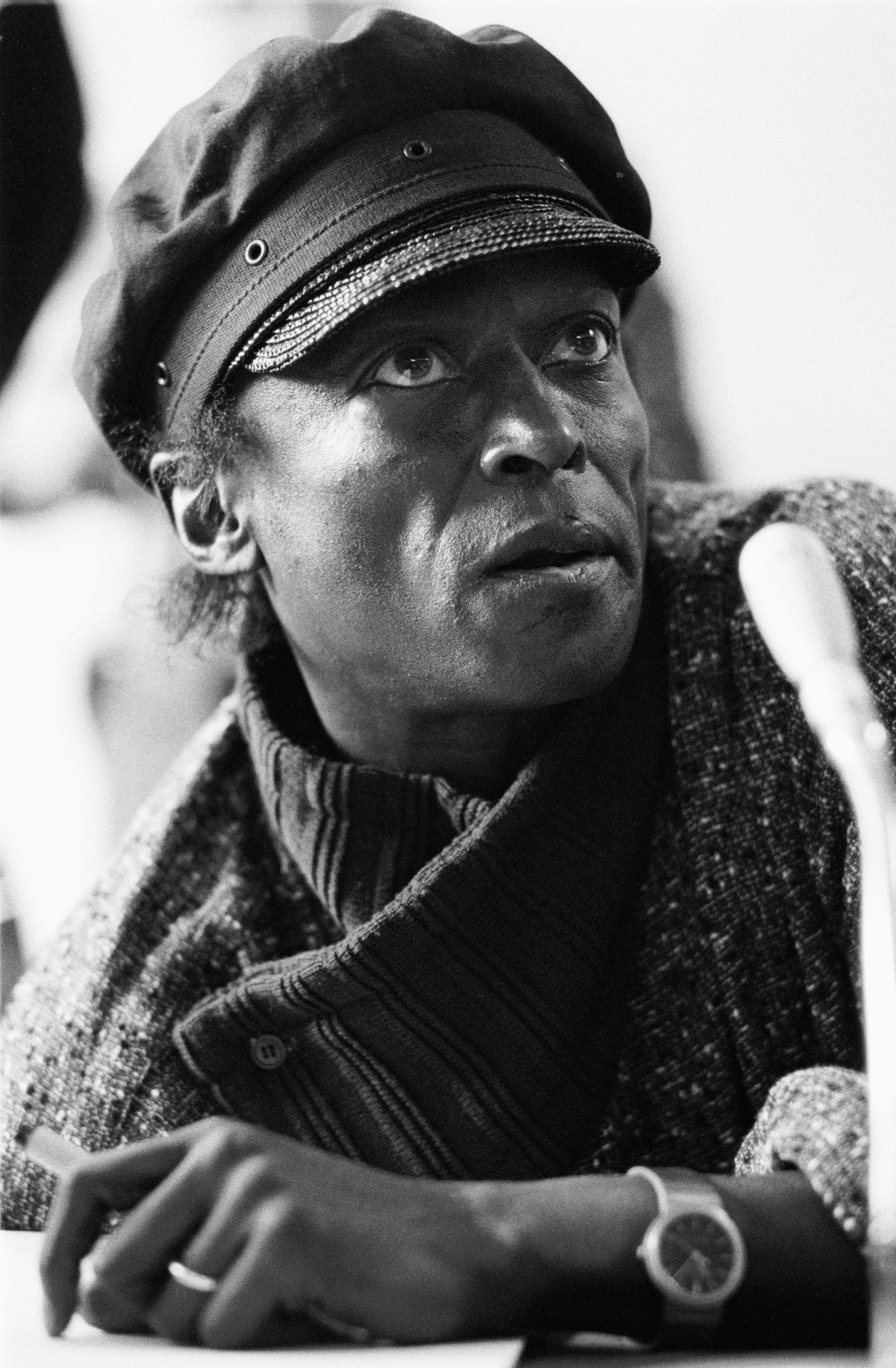
Miles’s mystique, says Ornette Coleman, has something to do with his “never having to be hungry in his life, never, for the most part, having to worry about money. Now, no other black musician—so-called jazz musician, that is—that I can think of can say that. It’s almost like Miles is a white man in a black man’s body. It produced an attitude that blacks can admire. It’s in the clothes he wears, the cars he drives, his attitude about himself and about others. It’s all there, in his total being. it’s about having money. It all adds up to mystique, and Miles definitely has that going for him. Has had it since I first saw him.”
Since his marriage to Cicely, Miles has been living most of the year in California, in Malibu. There are those who think that has affected his music negatively. But the hip implant causes him discomfort in cold weather, and he says the warm weather has been good for his health.
“New York makes Miles a little tougher,” says photographer Tony Barboza. “He doesn’t relax as much here. I think California is better for him now. Cicely is great for him, in a lot of ways. He was always fighting for his place in society in New York. He went through a lot of hist here.”
“Miles is mellowing out now. He’s beginning to see other things. He likes the sea wind slapping his face now, the calmness of it all, the atmosphere of the sea and beaches, the palm trees. It’s not like being run ragged, like what happens in New York. It’s another level on which to think about creativity.”
“Now nature is taking over and giving Miles another perspective. So it’s nice for him. he loves it in California. He can swim all the time out there, and man, he’s got legs so skinny it’s unbelievable that he can swim 20 laps at a time, but he does. He says it helps him with his playing.”
As we are getting on the elevator, I look again at Miles, very dark, slight, with a round back, and recall all the great musicians who have played in his many bands. I wonder where the players in his current band, Darryl Jones, Robert Irving, Bob Berg, Steve Thornton, and Vince Wilburn, will be in five, ten years from now, and I find myself wondering what this marvelously creative man will be doing then.
“He was able to attract a lot of great musicians around him,” Dizzy Gillespie said to me, “because he paid them well and because Miles is of the very highest quality of jazz musician, the very highest. So to play with Miles is something, really something. And when these great musicians leave him they don’t leave him to go with another band, they leave him to start their own bands. Now that’s a sign of leadership. Miles trains leaders.”
When we get downstairs, Miles asks if I can drop him off downtown. On the way he listens to a recent live tape he made in Austin, Texas. When we reach his destination, I ask him if there’ anything he wants me to leave out of what he has said.
As he gets out of the car, earphones on his head, dressed in black, just like on the cover of You’re Under Arrest, he pauses for a moment, scratches his chin and says, “Naw, you can tell it all.” He laughs and turns to walk into the building, then says over his shoulder, “because it’s all true. Let’s put them motherfuckers ‘under arrest.'”

